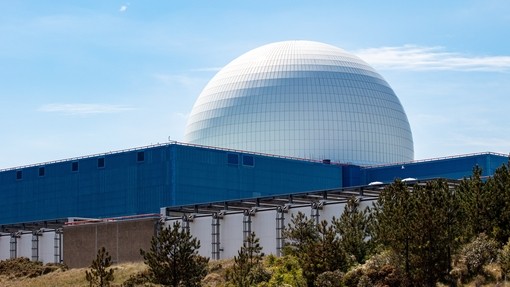
Why Sizewell C matters: Labour vow to make UK clean energy superpower
Following a landslide election success in January, the Labour party are in government for the first time since 2010.

Making the UK a clean energy superpower
During the election campaign, Labour repeatedly pledged to back clean and renewable energy generation projects moving forwards, with the aim of cutting bills, creating jobs in nuclear and other forms of energy generation, and accelerating towards net zero, with a target date set at 2030.
A key part of this is the launch of Great British Energy and the National Wealth Fund. Under the Government’s new plans, the National Wealth Fund will bring together key institutions and will mobilise billions more in private investment in the UK’s world-leading green and growth industries.
Great British Energy, spearheaded by the Secretary of State for Energy Security and Net Zero Ed Miliband, is a planned publicly owned investment body that will own, run and manage clean energy projects across the UK, including wind, solar and nuclear. With investment of £8.3 billion across the term of Parliament, Great British Energy will work with industry, local authorities, communities and other organisations to help accelerate Britain’s pathway to energy independence with thousands of clean power projects across the country.
The net result of this scheme aims to see 650,000 new jobs across all regions in the UK.
Focus on Sizewell C: What investment in the project means for the region
Nuclear energy is one of the key components of the Labour plan. Their commitment to investing in nuclear new build projects, both current and future, was met with praise from the industry. Ahead of the 2024 election, the Chief Executive of the Nuclear Industry Association, Tom Greatrex, stated in a press release:
“I welcome Labour’s commitment to progress vital new nuclear projects as part of its Great British energy plan. Hinkley Point C and Sizewell C will be cornerstones of the UK’s clean energy revolution, providing reliable zero-carbon power for 12 million people for over 80 years, creating thousands of good, green jobs. New stations too, including Small Modular Reactors, will boost energy security and bring investment to parts of the country that need it most, helping the UK become a clean energy powerhouse.”
The flagship project in the nuclear industry is the construction of the new reactor at Sizewell C on the east coast of England in Suffolk which will provide power to six million homes. The project is currently in its early stages, with site clearance underway and a significant ecology project ongoing to ensure that the area is cleared in an environmentally friendly way.
The Office of Nuclear Regulation (ONR) granted a nuclear site licence to the project in May 2024, its first since Hinkley Point C in 2012, but as of August 2024, the crucial Final Investment Decision for the project has still not been made, and is unlikely to be agreed until 2025, with discussions with investors moving slower than expected. This was partly due to the uncertainty that came with the announcement of a General Election earlier this year, with investors keen to wait to see the new government’s commitments. However, the new Labour government’s nuclear pledge and the foundation of Great British Energy has gone some way to pushing the project on.
Nuclear new build jobs at Sizewell C
One of the most notable advantages of the Sizewell C project is the vast number of job opportunities it will generate.
The project expects to employ around 7,900 people during the peak construction phase, with aims for a third of these people to come from the local area. Sizewell C will also create at least 1,500 apprenticeships and thousands more jobs in supply chain companies across the UK. These employment opportunities will span various fields, including engineering, construction, management, and administration.
Additionally, the Sizewell C project will play a crucial role in fostering skills development and promoting technological innovation. EDF Energy has already set up a training center near their Hinkley Point C nuclear power plant, offering local residents access to training and apprenticeship programs. These initiatives are designed to equip the community with the necessary skills to work in the nuclear industry and help mitigate potential skills shortages in the future, with a key focus on promoting careers in STEM from an early age.
Sizewell C’s sister project, the Hinkley Point C nuclear power station, is already delivering substantial benefits to the nearby communities in Somerset. Highlights include the recruitment of 922 apprentices, the creation of 15,000 job opportunities on the construction site, and over £4.1 billion spent with businesses across the South West. These achievements demonstrate the potential impact of Sizewell C.
Aside from jobs at Sizewell C itself, the knock-on effect of its construction will have a positive impact on the local community, with targets being set to source 80% of the food for its workforce from the local area, boosting the economy of the region. As the project progresses, we anticipate learning more about its economic contributions and advancements in scientific innovation.
A new government has committed to backing clean energy, and nuclear is set to be a substantial part of that. With schemes like Great British Energy already set in motion, it’s crucial that the Labour party delivers on its pledges, for the benefit of boosting the economy, providing new jobs and opportunities in nuclear, and achieving ambitious Net Zero aims.
Jobs at Sizewell C offer a range of opportunities for skilled and experienced workers who will each play a part in delivering clean, affordable, and sustainable energy for all.
Our recruitment for Sizewell C jobs is currently underway, and we are seeking a range of roles across various disciplines, including engineering, project management, construction, and environmental management. Click here to view our latest nuclear jobs
















